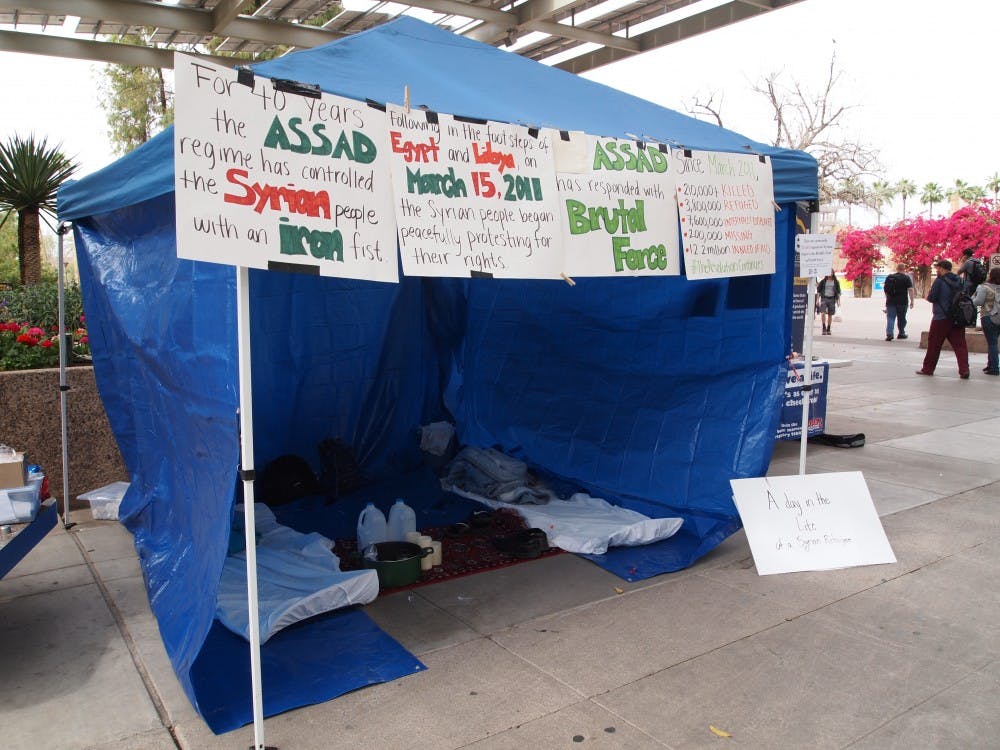 A mock Syrian refugee tent was set up on March 19, 2015 in the Memorial Union on the ASU Tempe campus to inform students about conflicts in Syria. (Kaitlyn Ahrbeck/The State Press)
A mock Syrian refugee tent was set up on March 19, 2015 in the Memorial Union on the ASU Tempe campus to inform students about conflicts in Syria. (Kaitlyn Ahrbeck/The State Press)ASU students were given the opportunity to experience how Syrian refugees live during Syria Solidarity Week, which is a week dedicated to raising awareness of the struggles Syrians face.
On Thursday, Students Organize for Syria at ASU shared stories, like the one below, with attendees to better explain the problems this Middle Eastern country.
“You are Mariam Abdulla. You are 19 years old. You live with your parents and two younger brothers.
“On April 17, 2013, Syrian dictator Bashar Al-Assad ordered his regime to drop barrel bombs on your neighborhood in Aleppo, Syria. Your home was completely destroyed and one of your brothers died due to a wall collapsing on his body.
“You no longer have a home, and you must now flee Syria and live in a refugee camp on the borders of Syria and Turkey. Welcome to your new ‘home.’”
Abdulla isn't the woman's real name, and her story is not unique. She is just one of the 3.7 million registered Syrian refugees in the Middle East and North Africa, according to the UN Refugee Agency.
In order to to raise awareness about the living conditions of Syrian refugees, biochemistry and justice studies junior Zana Alattar and her organization, Students Organize for Syria at ASU, hosted Syria Solidarity Week on the fourth anniversary of the start of the Syrian Revolution.
Over 3.7 million civilians from Egypt, Lebanon, Iraq, Jordan and Turkey have been forced out of their homes since the start of the Syrian Civil War, which began four years ago this week. With little to no resources, they have been forced to take refuge in tents, sleeping on paper-thin mattresses and surviving off of potatoes and boiled rice.
For the past 40 years, Syria has been a country under turmoil. Former Syrian President Hafez Al-Assad ruled his people under a strict regime. After his death in 2000, his son Bashar Al-Assad took over and has continued ruling with the same iron fist as his father.
 Basic supplies for typical Syrian refugees are set up inside the mock Syrian refugee tent set up on March 19, 2015 in the Memorial Union on the ASU Tempe campus. (Kaitlyn Ahrbeck/The State Press)
Basic supplies for typical Syrian refugees are set up inside the mock Syrian refugee tent set up on March 19, 2015 in the Memorial Union on the ASU Tempe campus. (Kaitlyn Ahrbeck/The State Press)On March 15, 2011, Syrian citizens began asking for reform by protesting their president’s actions. The Syrian government fought back with violent crackdowns, sparking a civil war.
Soon after, an armed rebellion developed, causing a major shift to the war. As a result, more than 4 million civilians were forced to abandon their homes.
“Syria Solidarity Week is a campaign to raise awareness for Syrian refugees,” Alattar said. “We focus on three different components: education and awareness, advocacy, and humanitarian relief efforts.”
The education and awareness part is simple, but tedious: share the stories of Syrian refugees with as many students as possible. Setting up a mock Syrian refugee tent has been one of the more successful events during the week, Alattar said.
Advocating for Syria has not been as easy. Members of Students Organize for Syria at ASU have been writing to Congress to establish a no-fly zone over Syria to stop the bombing of chemical weapons.
“Syrians are dying from chemical weapons,” Alattar said. “We have sent out letters nationally and want to send letters from each state.”
Since the start of the war, over 210,000 civilians have died and just as many are missing.
“With the number of people dying, they become statistics,” Alattar said. “These are 210,000 stories, mothers, sisters, brothers. We miss personalization by just handing out statistics.”
Biochemistry junior Tej Hendel, publicist for Students Organize for Syria at ASU, said it is time for Syrian refugees to be liberated from the lifestyle they have been forced to live.
“It comes down to basic human rights,” Hendel said. “They should be allowed to practice life as they want to live it and not be punished.”
Alattar, who has experienced the plight of Syrian refugees first-hand during her humanitarian trip there in 2013, wants everyone to know the long-winded fight Syrians have been putting up for their rights.
“It’s important to understand the struggle Syrians have been dealing with fighting for their rights,” Alattar said.
Reach the reporter at Jlsuerth@asu.edu or follow @SuerthJessica on Twitter.
Like The State Press on Facebook and follow @statepress on Twitter.




